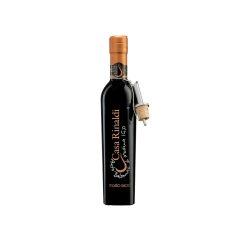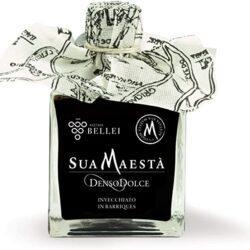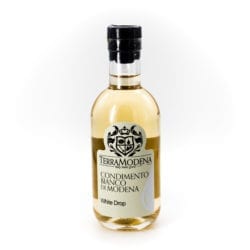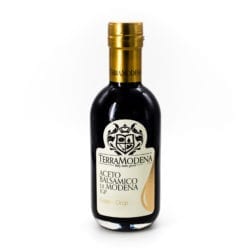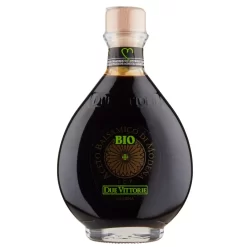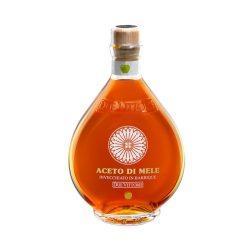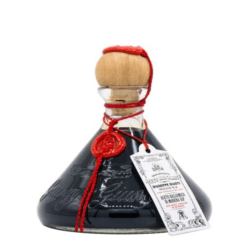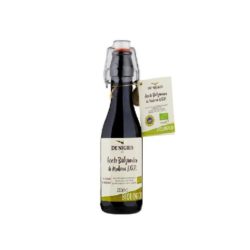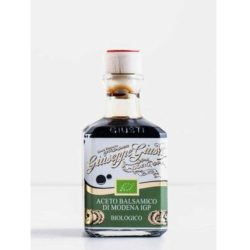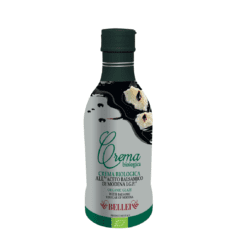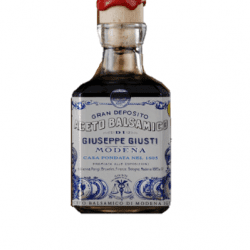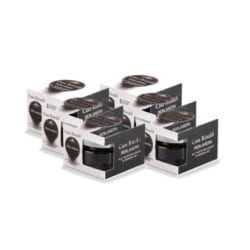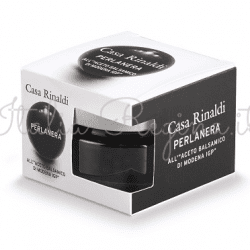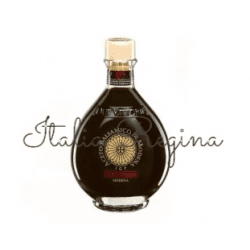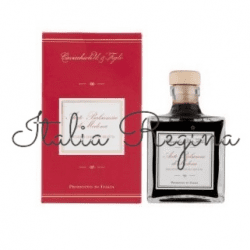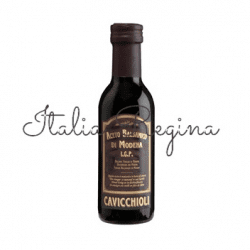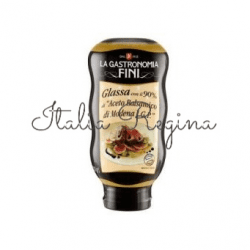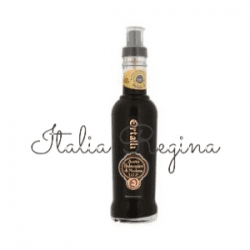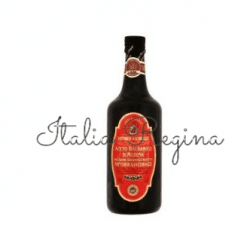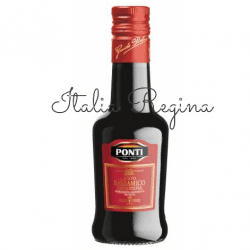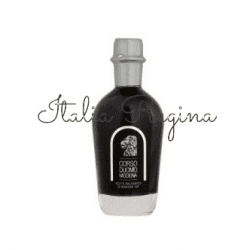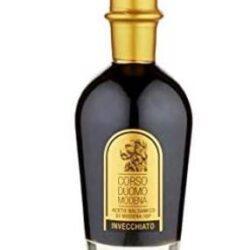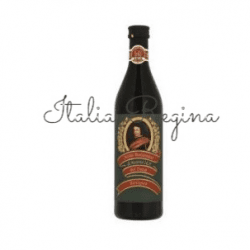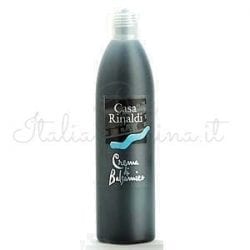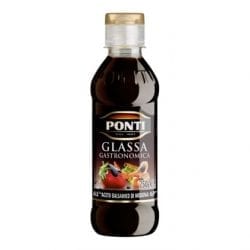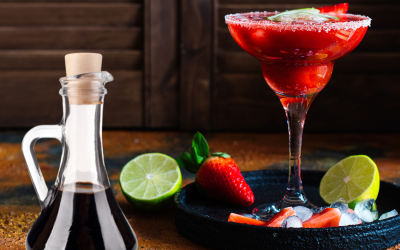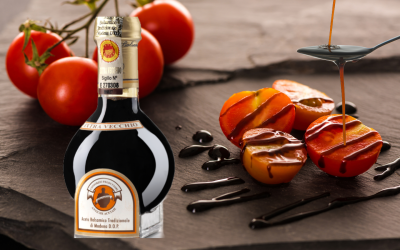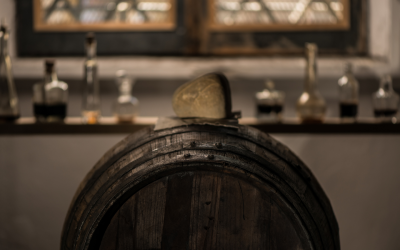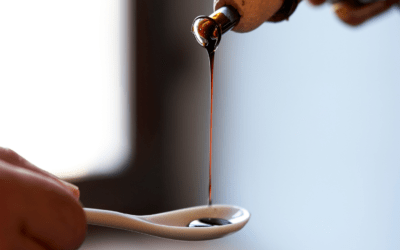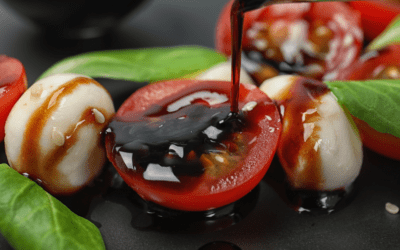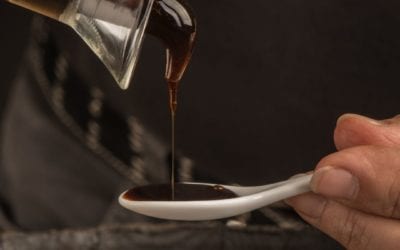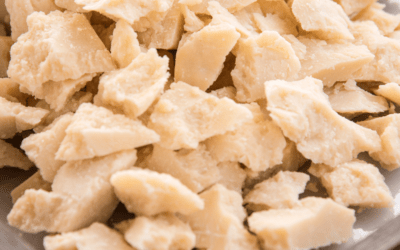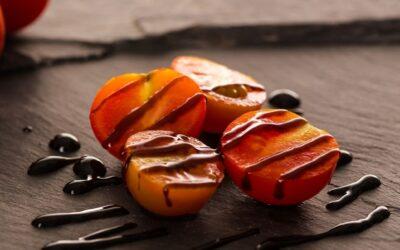Italian Balsamic Vinegar
Italian Balsamic Vinegar can dress from salads to strawberries and can set the stage for a marvelous meal. Italy is the home to the most exquisite oils and vinegar in the world. The different levels of aging give these products superb versatility that can range from everyday cooking to special occasions! There are two versions of this special product of Italy: the original traditional (Aceto Balsamico Tradizionale) PDO is made from a reduction of cooked white Trebbiano grape juice. It has been produced in Modena and Reggio Emilia since the Middle Ages. The second one, also originating from the same area, is GPI. It is less expensive but still very tasty.
Buy online now!
-

Balsamic Vinegar “Mosto Sacro” Casa Rinaldi with Spout
€16.99 -

White Balsamic Vinegar Sua Maestà – 250 ml
€22.00 -

Balsamic vinegar PDO – 12 years aged
€45.00 -

Balsamic Vinegar Sua Maestà – 250 ml
€24.00 -

Black Drop – balsamic vinegar with Truffle – 100ml
€8.99 -

White Balsamic Vinegar – TerraModena
€9.90 -

Gold Drop PGI Balsamic vinegar – TerraModena
€16.90 -

Organic Balsamic Vinegar Gold PGI – 250 ml
€18.90 -

Apple Cider Vinegar Aged – Due Vittorie 250 ml
€8.50 -

Balsamic Vinegar PGI “Zucchetta” – 250 ml
€28.00 -

Organic Balsamic Vinegar PGI – 250 ml
€19.90 -

Organic Balsamic Vinegar Modena PGI – 250ml
€19.90 -

Organic Balsamic Vinegar Glaze – 250 ml
€7.90 -

Balsamic Vinegar Sua Maestà gift box
€27.00 -

PGI Balsamic Vinegar – Quadrotta
€17.00 - Sale!

PDO Balsamic Vinegar – aged 12 years
Original price was: €75.00.€42.00Current price is: €42.00. -

Balsamic Vinegar Giusti “Il Profumato”
€14.00 - Sale!

Balsamic Vinegar Mosto Sacro – Box: 6 bottles
Original price was: €101.40.€89.90Current price is: €89.90. - Sale!

Black Pearls Of Balsamic Vinegar PGI – Box: 6 jars
Original price was: €59.90.€49.90Current price is: €49.90. -

Black Pearls Of Balsamic Vinegar Of Modena PGI – 200 gr
€9.90 -

Balsamic Vinegar Cream of Modena White
€7.00 -

Balsamic Vinegar Due Vittore Oro – 250 ml
€14.90 -

Balsamic Vinegar (Modena PGI, Box Included) – Cavicchioli
€18.60 -

Balsamic Vinegar (Modena IGP) – Cavicchioli
€8.90 -

Balsamic Vinegar Glaze (Modena IGP) – Fini
€4.75 -

Balsamic Vinegar (Modena IGP) – Fini
€8.99 -

Balsamic Vinegar (Modena IGP) – Ortalli
€17.25 -

Balsamic Vinegar (Aged Amphora IGP) – Fattorie Giacobazzi
€24.98 -

Balsamic Vinegar (Modena IGP) – Fattorie Giacobazzi
€18.50 -

Balsamic Vinegar (Modena IGP 500ml) – Ponti
€9.90 -

Balsamic Vinegar (Modena PGI)
€11.84 -

Balsamic Vinegar (Aged Modena PGI)
€18.00 -

Balsamic Vinegar (Organically Grown Grapes) – Aceto Balsamico del Duca
€8.25 -

Balsamic Vinegar Cream of Modena
€8.90 -

Balsamic Vinegar of Modena and Extra Virgin Olive Oil (Gift Set) – Casa Rinaldi
€12.00 -

Balsamic Vinegar Glaze – Ponti
€6.50
Discover an Italian Excellence
Balsamic vinegar originates from Italy but is very popular worldwide. This type of vinegar was created in two specific areas in Italy: Modena and Reggio Emilia. According to traditional methods, these areas in Italy provide the perfect conditions to produce vinegar.
Their mixture of very hot summers and bitterly cold winters creates the best climate for grape must mature and ferment. It has been produced in Modena and Reggio Emilia since the Middle Ages, dating as far back as 1046.
It is written in history that when Henry III, the Emperor of Germany, traveled to Rome for his coronation, he asked for a special vinegar as a gift when he stopped in Piacenza. While there he wrote that he had heard of vinegar which flows in the perfect manner – he was describing the balsamic. This type of vinegar is a traditional condiment of Emilian cuisine, made with the cooked must of grapes which comes exclusively from Modena and Reggio Emilia. It is fermented, acetified, and then aged. It is rich, glossy, deep brown in color, and has a complex flavor that balances the natural sweet and sour elements with a hint of wood +from the barrels that it is stored in for a minimum of 12 years.
History of the “black gold”
“Aceto balsamico”, in Italian, does not contain any balsam. The term balsamico derives from the Latin word “balsamum” and from the Greek word “βάλσαμον”, in the sense of “restorative” or “curative”. The art of cooking the grape must, dates back to the ancient Romans. The ancients used it both as a medicine and in the kitchen as a sweetener and condiment.
The story of this tipical italian product starts in XXII century in the little city of Modena.
In 1046, while traveling through Po Plain, Henry III, Emperor of the Holy Roman Empire, was given a “very perfect vinegar” by Bonifacio, Marquis of Tuscany. At the end of 1200, the art of vinegar production was cultivated at the Este Court in Modena: the term “balsamic” appeared for the first time in 1747 in the registers of the cellars of the Dukes of Este. In the little city of Spilamberto, near Modena, you can find also a special Museum.
Why is it called this way? The origin of a particular name
Since Roman age, vinegar was recommended in many Italian medical manuals like an elixir. The root “balm” refers to something with healing powers. The term “balm” comes from the Greek, a word used to indicate the refreshing and healing effect of a liquid for the respiratory tract
What is the difference between PDO, GPI?
Traditional Aceto balsamico di Modena and Traditional Aceto balsamico of Reggio Emilia are both protected by the Italian “Denominazione di Origine Protetta” of Italy and the “Protected Designation of Origin of the European Unit”. Any single detail of how the “black gold” is produced and aged is regulated. Due to the standards of the consortia in these two regions not only is the bottle shape regulated but even the foil that covers the cap.
A “love story” with Modena plays an essential role in building the indisputable fame that black gold enjoys in almost 120 countries worldwide, where it exports over 90% of its annual production of more than 90 million liters. There are two consortia. One is the “Consortium for the protection of traditional balsamic vinegar from Reggio Emilia” which includes 64 certified producers. The other is the “Consorzio Tutela Aceto Balsamico di Modena”, 50 Companies are now associated with this consortium.
All Italiaregina.it products are produced by the certified producers of Aceto Balsamico from Reggio Emilia or Modena.
Once the 60-day maturation stage in wooden vats has been completed, it can be further aged by being transferred to precious smaller barrels: after three years the product can get the IGP “aged” classification. Every year, using a special method of decanting, the smallest cask of the sequence provides a few liters of the product, while the reduction due to concentration is compensated for by the addition of cooked grape-must to the largest cask.
Only after at least 12 or 25 years of maturing does the product reach that surprising balance of aromas and flavor that allows it to bear the title of PROTECTED ORIGIN DENOMINATION (P.D.O.).
Discover Production’s secrets
This particulare vinegar is made from grape must that is fermented which can then be cooked and/or concentrated. To be GPI the grapes can come only from Lambrusco, Sangiovese, Trebbiano, Albana, Ancellotta, Fortana and Montuni vines. The minimum amount of wine vinegar added is 10% and must be aged for at least 10 years.
For the acidification selected bacterial colonies or the “lenta in superficie” (slow surface) or “lenta a truciolo” (slow wood shavings) methods are used and then there is the maturing phase. Both the acidification and maturation take place in precious sessile oak, chestnut, oak, mulberry, and juniper barrels.
The minimum maturing time is 60 days and after this period a group of expert technicians tests and analyzes organoleptic results from the product.
Why the “black gold” is so expensive?
Where to use it?
Being sweet and acidic at the same time, this vinegar is perceived differently depending on the use. Pairing nicely with both hot or cold dishes.
It’s is used as a condiment for salads, but also on meat and fish, boiled meats, cheeses (it is used also with Parmigiano-Reggiano). It is used both as an addition at the end of cooking and as an ingredient for the preparation of the dishes. In recent times, it has spread its use even on desserts and fruits (particularly strawberries, peaches, and tropical fruits).
News & Recipes
Balsamic Vinegar Cocktails: a unique twist on mixology
Balsamic vinegar, traditionally used to enhance culinary dishes, has found a new home in the mixology world and engaging more and more bartenders. Its complex flavor profile, with a balance of acidity and sweetness, makes it a versatile ingredient for a range of...
Why are PDO balsamic vinegar bottles uniform?
Unraveling the tradition and standards of the “black gold” the true balsamic vinegar PDO bottle: understanding the shape reasons anc divergences between producers
How it works balsamic vinegar aging
One of the most captivating aspects of Balsamic vinegar is its aging process, which contributes to the complexity of its flavor, to the density… and to the high cost!
Made Green in Italy for Balsamic Vinegar
In Italy the proposal that the Consortium formulated to the Ministry of Ecological Transition regarding the Category Rule (RCP) was officially accepted and published in June. This made possible to start an important study and improvement work on the environmental...
Balsamic Vinegar PGI
Balsamic Vinegar PGI of Modena is produced in the territories of the province of Modena and, although the name does not suggest it, also in those of the province of Reggio Emilia. It is a lower quality vinegar than PDO. More widespread, cheaper, but also less pure. As...
Giusti Balsamic Vinegar: Giuseppe Giusti
Balsamic vinegar, to be perfect has to have salient parameters such as the dark brown color, full and bright, the intense smell, which hides grape aromas and hints of wood wines, the agro resulting from the slow acetification, and the complexity of the aromas...
Giuseppe Giusti Balsamic Vinegar Recognitions
Between the nineteenth and twentieth centuries the Giuseppe Giusti Balsamic Vinegars made themselves known all over the world and enjoyed unanimous success among the European public…
Balsamic Vinegar of Modena
Balsamic vinegar of Modena, thanks to its unmistakable bitter-sweet flavor that lend itself to the most varied combinations in the kitchen, to its velvety density, which is a real pleasure for the palate, has distinguished itself all over the world, soon becoming...
Parmesan aged: Different Types
A Parmesan aged (Parmigiano Reggiano) has at least 12 months, the highest among cheeses: at that point only the forms deemed suitable for the selection examination can continue aging for 24 months or more. Only the forms that have the essential characteristics...
Balsamic Vinegar Composition
Knowing what is balsamic vinegar composition is a very common curiosity. The fundamental difference between every other vinegar and balsamic vinegar consists of the raw material: grape must. Photo credit: wikipedia According to experts, three factors are fundamental...
Balsamic Vinegar Health Benefits
Balsamic vinegar health benefits are many, and today we are going to tell you 5 of them. Balsamic vinegar is a real panacea that, used day after day, will be appreciated not only by the palate! Benefit # 1: It helps you lose weight Balsamic vinegar is a...
The Origin of Balsamic Vinegar Term
What is the origin of balsamic vinegar term? Well, the term "balsamic" coined in 1747 for the first time, only serves to differentiate this type from the classic one, since the starting matrix is the same: both, in fact they are derived from wine grapes. Balsamic...

